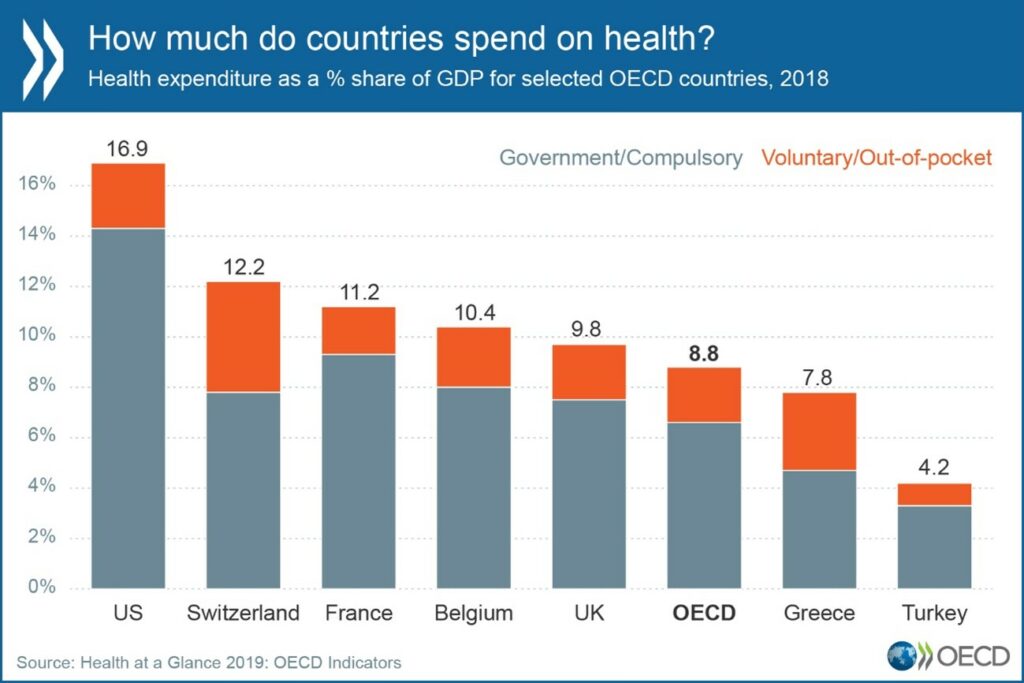Less is more? The true meaning of hospital efficiency

Hospital efficiency is everyone’s mission. From the health professionals who live it, to the patients and citizens who demand it and the rulers who regulate it. So often associated with cost reduction, job loss and poor quality, hospital efficiency is a much broader concept.
What does this concept mean, anyway? How is it measured? And why do some countries outperform others? Above all, what can hospitals do to increase efficiency and provide better care?
What is hospital efficiency?
Hospital efficiency, like any measure of efficiency, evaluates the results achieved in relation to the resources consumed.
Hospitals and healthcare systems usually assess their performance by tracking the number of medical consultations, the volume of examinations and surgeries, waiting times and the average life expectancy of patients. The other side of the equation is the resources needed to achieve these results, such as costs, time spent, number of professionals allocated or energy consumed. On a national scale, the total cost is measured as a proportion of the country’s GDP allocated to healthcare or as a cost per capita. Hospital efficiency thus refers to this relation between results and costs, between outputs and inputs to the system.
Increasing hospital efficiency requires the ability to do more with fewer or equal resources. To serve more people and with better quality without increasing costs in the same proportion.
Why does hospital efficiency matter to everyone?
In a hospital, every second matters and an error can cost lives. In its halls and rooms, resource management determines the quality of treatments, the satisfaction of professionals and even the economic performance of the country.
Even before the pandemic in 2019, health spending worldwide reached a record $8.3 trillions about 10% of the world’s GDP. A number that dwarfs the funds allocated by governments to family policies, housing and unemployment – combined.

Some countries, such as the USA, Switzerland and France, spend vastly more than the world’s average per capita. In the U.S., in particular, the cost of health per capita is more than $10,000, between public spending and private payments. Despite having the highest per capita cost in the world, the US life expectancy averages at just 79 years. It is lower than Sweden for instance, where life expectancy is 82 years and healthcare costs per capita are half that of the U.S.
Unsuitable processes and technologies: the causes of hospital efficiency failure
Why is hospital efficiency so different? In the U.S., recent studies show how 30% of total healthcare investment is spent on unnecessary or inefficiently provided services, excessive administrative costs, very high drug and medical material prices, missed prevention opportunities, and even fraud. And healthcare costs continue to rise faster than GDP around the world, impacting the budgets of governments, companies and individuals.
Some of the main efficiency losses are familiar to those privy to hospital reality. Studies show how nursing teams, for example, spend approximately 7% of their time searching for medicines and medical consumption material. And another 72 minutes per shift in search of colleagues, patients, beds and other resources. Doctors, on their part, devote almost half of their time analyzing documents and inputting data.
Administrative expenses alone account for 25% of hospital costs, which include insurance processing or registration of discharges. Why? Inadequate processes, obsolete equipment and the absence of reliable data on which to build a culture of continuous improvement are some problems that can be acted on immediately.
Hospital efficiency in the future – more quality of treatment, fewer administrative tasks
Greater hospital efficiency is a pre-requisite to higher quality in medical care. These two concepts are intrinsically linked because less time spent in administrative tasks equals more time with patients. To increase hospital efficiency, there are 3 strategies for the short term.
1. Improve the “patient journey”
The patient’s journey is the sequence of steps that each person follows from registration to discharge. Efficient hospitals review processes and use technology to make this process more agile and reduce friction in interactions. With patient feedback, it is possible to review and improve hospital flows, namely the locations of people, stocks and equipment. That’s why at Somengil we analyze the workflow of each process before installing the MultiWasher Healthtech, our washing equipment for medical utensils, tools and dishwashers with hospital quality. We streamline processes with machines that adapt to the flow of each hospital, to make patient journeys more fluid.
2. Contributing to food security
Hospitals play a key role in food security. Food safety is the set of practices that prevent food contamination from harming public health and includes inspection, verification, auditing and control. At Somengil, we develop professional washing machines so that organizations can sanitize any utensil, tool or equipment. The state-of-the-art MultiWasher Healthtech reaches high temperatures and washes any utensil using minimal amounts of detergent. This way, the quality of washing is ensured in every cycle.
3. Continuous data-based improvement
To measure hospital efficiency, it is common to use indicators such as the average patient’s stay, bed occupancy rate, waiting times in each service, or operating room occupancy rates. It is less common to find data about the execution of the processes themselves, such as cycle time or Overall Equipment Efficiency (OEE). In the washing process, for example, our machines measure and record variables such as cycle time, temperature and speed. This detailed and automatic information promotes continuous improvement based on data, both in equipment and in our washing processes.
Somengil, working together for hospital efficiency
At Somengil, we design professional washing solutions tailored to the needs of each hospital. At the heart of our activity is a clear focus on efficiency, patient satisfaction, quality, and compliance.
MultiWasher Healthtech is a washing machine designed with the needs of smart hospitals in mind, where the power of data and technology is put to use for the benefit of the patients. With this machine, it is possible to optimize costs in water use, improve patient outcomes, increase team productivity and comply with changes in regulations. This holistic approach is our answer to the healthcare challenges of today and tomorrow.



